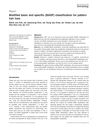
Alopecia Areata has no cure, treatments are limited, and the condition often recurs, but new therapies like JAK inhibitors show promise.
 99 citations,
October 2006 in “BMC clinical pharmacology”
99 citations,
October 2006 in “BMC clinical pharmacology” Finasteride may cause slight depression and anxiety.
 51 citations,
October 2002 in “British Journal of Dermatology”
51 citations,
October 2002 in “British Journal of Dermatology” Finasteride increases hair density in female androgenetic alopecia, but individual results may vary.
 50 citations,
March 2017 in “PeerJ”
50 citations,
March 2017 in “PeerJ” Using finasteride or dutasteride may cause long-lasting erectile dysfunction.
 4 citations,
May 2020 in “PLOS ONE”
4 citations,
May 2020 in “PLOS ONE” Ingenol mebutate gel changes gene expression related to skin development and immune response in actinic keratosis.
 4 citations,
March 2018 in “PloS one”
4 citations,
March 2018 in “PloS one” Men with less sun-sensitive skin have lower PSA levels, while men with more sun-sensitive skin have higher PSA levels.

Early detection and comprehensive treatment of PCOS are crucial due to its long-term health impacts and associated risks.
 September 2017 in “Springer eBooks”
September 2017 in “Springer eBooks” Low-level laser therapy seems to promote hair growth but requires more research to confirm its effectiveness.
 3 citations,
September 2019 in “PLOS ONE”
3 citations,
September 2019 in “PLOS ONE” Genetic variations affect dutasteride treatment response for male pattern hair loss.
 291 citations,
January 2014 in “The Scientific World Journal”
291 citations,
January 2014 in “The Scientific World Journal” Lichen Planus is a less common condition affecting skin and mucous membranes, with various types and associated risk factors, challenging to diagnose, significantly impacts life quality, and may have a risk of cancerous changes in oral lesions.
 218 citations,
December 2011 in “Advances in Urology”
218 citations,
December 2011 in “Advances in Urology” The document concludes that the 5 alpha-reductase enzymes are important in steroid metabolism and related to various human diseases, with inhibitors used to treat conditions like male pattern baldness and prostate issues.
 61 citations,
April 2014 in “Radiation Research”
61 citations,
April 2014 in “Radiation Research” RTA 408 cream protects mice from radiation skin damage.
 53 citations,
January 2017 in “BioMed research international”
53 citations,
January 2017 in “BioMed research international” Genetically modified plants could be an important source of omega-3 fats to meet global needs.
 36 citations,
June 2019 in “eLife”
36 citations,
June 2019 in “eLife” The study developed a tool to predict how gut microbes process foods and drugs, showing that similar compounds often share metabolic pathways and effects.
 32 citations,
November 2016 in “Journal of Dental Research”
32 citations,
November 2016 in “Journal of Dental Research” Pannexin 3 is important for bone formation and the development of bone cells.
 29 citations,
January 2009 in “International Journal of Trichology”
29 citations,
January 2009 in “International Journal of Trichology” Finasteride for hair loss may cause gynecomastia; doctors should inform patients.
 22 citations,
August 2009 in “Evidence-based Complementary and Alternative Medicine”
22 citations,
August 2009 in “Evidence-based Complementary and Alternative Medicine” The composition with carnitine, thioctic acid, and saw palmetto extract may effectively reduce inflammation in hair follicle cells.
 20 citations,
January 2013 in “Evidence-based complementary and alternative medicine”
20 citations,
January 2013 in “Evidence-based complementary and alternative medicine” TGPC plus CGT is effective and safe for treating severe alopecia areata in children.
 15 citations,
November 2015 in “Dermatology Research and Practice”
15 citations,
November 2015 in “Dermatology Research and Practice” No clear link between hair loss and metabolic syndrome, but some differences in blood pressure and glucose levels.
 15 citations,
November 2012 in “International Journal of Dermatology”
15 citations,
November 2012 in “International Journal of Dermatology” The conclusion is that hair loss from CCCA may be genetic and not solely caused by hair grooming practices.
 2 citations,
June 2019 in “International Journal of Dermatology”
2 citations,
June 2019 in “International Journal of Dermatology” The modified hair loss classification is more detailed but less user-friendly.
 2 citations,
January 2017 in “Journal of Pigmentary Disorders”
2 citations,
January 2017 in “Journal of Pigmentary Disorders” Genetics, stress, and health issues can cause early hair greying, which affects self-esteem, and there's no cure, only hair dye.
 2 citations,
February 2014 in “Hair therapy & transplantation”
2 citations,
February 2014 in “Hair therapy & transplantation” Alopecia Areata is an autoimmune condition causing hair loss, influenced by genetics, environment, and possibly improved by anti-MIF therapy, with many patients experiencing regrowth within a year.
 July 2018 in “Elsevier eBooks”
July 2018 in “Elsevier eBooks” Frontal Fibrosing Alopecia is a type of hair loss affecting mostly older women, with no agreed best treatment.
 August 2015 in “Dermatología Argentina”
August 2015 in “Dermatología Argentina” Frontal fibrosing alopecia causes hairline recession and eyebrow loss in postmenopausal women.

Human scalp hair follicles have PGE2 and its receptors, which might affect hair growth.

Avicennia marina extract and avicequinone C can potentially promote hair growth and treat hair loss by interfering with hair loss mechanisms and boosting growth factors.
 160 citations,
January 2017 in “Development”
160 citations,
January 2017 in “Development” Blood vessels and specific genes help turn cartilage into bone when bones heal.
 96 citations,
January 2013 in “International Journal of Trichology”
96 citations,
January 2013 in “International Journal of Trichology” Trichoscopy is a useful, non-invasive way to diagnose different types of hair loss.
 22 citations,
October 2012 in “Journal of Investigative Dermatology”
22 citations,
October 2012 in “Journal of Investigative Dermatology” Altered retinoid metabolism in cicatricial alopecia suggests a balanced vitamin A diet may prevent the condition.






























